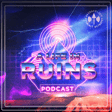
Microfauna Analysis at the La Prele Mammoth Site: Implications for Clovis Diet and Paleoenvironments with McKenna Litynski - Ep 147
For this week's episode, we are joined by McKenna Litynski, a newly minted PhD student at the University of Wyoming. And we say newly, because she literally just defended her MA thesis this past week at the University of Wyoming. McKenna is also the youngest person we know in graduate school, let to have a Master’s Degree. We delve into her early years and how she got into archaeology. Then we take a deep dive into her thesis and her research. We end the episode talking about what the future looks like for her.
If you have left a podcast review on iTunes or Spotify, please email us at [email protected] so we can get shipping information to send you a sticker.
If you are listening to this episode on the "Archaeology Podcast Network All Shows Feed," please consider subscribing to the "A Life in Ruins Podcast" channel to support our show. Listening to and downloading our episodes on the A Life in Ruins channel helps our podcast grow. So please, subscribe to the A Life in Ruins Podcast, hosted by the Archaeology Podcast Network, on whichever platform you use to listen to us on the "All Shows Feed." Please support our show by following our channel.
Transcripts
For rough transcripts of this episode go to https://www.archpodnet.com/ruins/147
Literature Recommendations
- Clovis Hunting Strategies, or How to Make out on Plentiful Resources by Nicole M. Waguespack and Todd A. Surovell
- Should we expect large game specialization in the late Pleistocene? An optimal foraging perspective on early Paleoindian prey choice by David A. Byers and Andrew Ugan
- The Archaeology and Paleoecology of the Aubrey Clovis Site (41DN479) Denton County, Texas by C. Reid Ferring
- Misidentified Clovis-age fish bone at Shawnee-Minisink and the problem with single case studies in Late Pleistocene archaeology by Joseph A.M. Gingerich, Thomas R. Whyte and Scott Whittaker
Guest Contact
- Instagram: @mllitynski
- email: [email protected]
Contact
- Email: [email protected]
- Instagram: @alifeinruinspodcast
- Facebook: @alifeinruinspodcast
- Twitter: @alifeinruinspod
- Website: www.alifeinruins.com
- Ruins on APN: https://www.archaeologypodcastnetwork.com/ruins
- Store: https://www.redbubble.com/people/alifeinruins/shop
